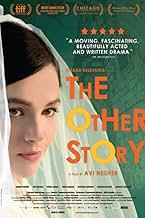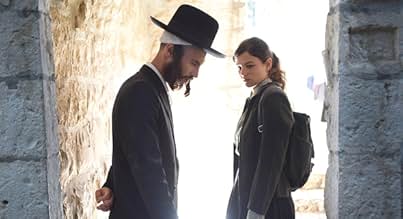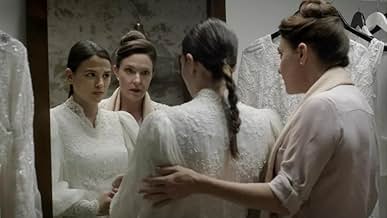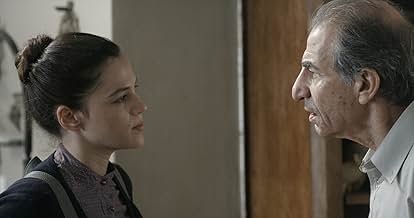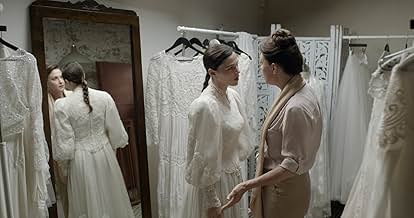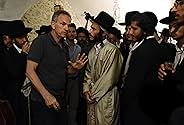Ajouter une intrigue dans votre langueTwo rebellious young women - one fleeing the chaos of secular hedonism for the disciplined comforts of faith; the other desperate to transcend her oppressive religious cross paths unexpected... Tout lireTwo rebellious young women - one fleeing the chaos of secular hedonism for the disciplined comforts of faith; the other desperate to transcend her oppressive religious cross paths unexpectedly in Jerusalem, to startling consequences.Two rebellious young women - one fleeing the chaos of secular hedonism for the disciplined comforts of faith; the other desperate to transcend her oppressive religious cross paths unexpectedly in Jerusalem, to startling consequences.
- Réalisation
- Scénario
- Casting principal
- Récompenses
- 1 victoire au total
Sasson Gabay
- Shlomo Abadi
- (as Sasson Gabai)
Chancela Mongoza
- Bass Player
- (as Sean Mongoza)
Adam Emanuel Propp
- Rabbi
- (as Adam Emanuel)
Avis à la une
9Nozz
An old criticism of Israeli movies is that because of the nature of Israeli society, too many filmmakers are less eager to present a protagonist we can easily identify with and follow than to present a gang of friends without a clear central focus. Avi Nesher's recent movies, although fascinating to watch, have sometimes lacked a very dominant protagonist and given the audience (by which I mean me) too many characters and too many plot threads to easily keep track of all at once. The Other Story has a lot of main characters but it doesn't suffer from that problem. Initially, it has a different problem. An engaged couple have embraced ultra-Orthodox Judaism and the parents of the bride-to-be want to torpedo the relationship and ultimately persuade the girl to leave the ultra-Orthodox environment. The movie's problem is that the audience (by which I mean me) can't root for either side in the conflict. They're both presented as offputtingly extreme. The movie comes to life when a new couple is introduced, a younger couple who are fighting over their child and over the woman's participation in a pagan cult. Here Nesher has done some interesting casting. He's perhaps Israel's foremost moviemaker today and he can get pretty much any actors he wants. The bride gone ultra-Orthodox, her parents, and her grandfather are all wonderful actors and well-known faces. But the younger couple are not very familiar actors, and that makes them a presence of a different kind; when you see them you don't say "ah, here's one of my favorite actors, this will be good." Their story (The Other Story? Maybe that's one meaning of the title) seems more concrete because the audience (by which I mean me) hasn't seen them outside it. And even as their story impacts the main story and everything affects everything, the movie proceeds without confusion. It takes a couple of strategically inserted speeches of exposition to keep the audience aware of all the background, but the audience doesn't lose track. And the question of who, if anyone, can intervene to save this dangerously unstable young couple, or at least to save their child, gives the plot an impetus that wasn't present in the conflict over living or not living the ultra-Orthodox life.
The movie is the acting debut of singer-songwriter Nathan Goshen. Nesher may have been charmed by the fact that Goshen himself is a musician who did at one point become ultra-Orthodox, like the character he plays, and was even able to contribute a song or two to the movie, but unfortunately his musical contribution is not very compelling. The incidental music, although a little heavy on the sentimental violins, is much better.
The various plot threads ultimately resolve themselves with a kind of Shakespearean simultaneity, and the audience (by which I mean me, and the critics I've read) goes away impressed that Avi Nesher has done it again. If not his best movie ever-- though it has been called that-- then the best-integrated movie of his career's second Israeli phase.
The movie is the acting debut of singer-songwriter Nathan Goshen. Nesher may have been charmed by the fact that Goshen himself is a musician who did at one point become ultra-Orthodox, like the character he plays, and was even able to contribute a song or two to the movie, but unfortunately his musical contribution is not very compelling. The incidental music, although a little heavy on the sentimental violins, is much better.
The various plot threads ultimately resolve themselves with a kind of Shakespearean simultaneity, and the audience (by which I mean me, and the critics I've read) goes away impressed that Avi Nesher has done it again. If not his best movie ever-- though it has been called that-- then the best-integrated movie of his career's second Israeli phase.
I'm impressed a man wrote and directed this film, concerned with the fragility of human relationships
I'm so glad I saw this with the man himself presenting the film in the Monterrey Film Festival. Boom! the credits. When I least expect it, 2 hours have passed, I mean, not many films have that characteristic while maintaining the highest quality in terms of screenwriting and acting. I remember Avi Nesher said its movie don't have the traditional 3 act structure, which makes it very enjoyable in a fresh and interesting way. It was also very cool to watch a Israeli film without clichés or stereotypes, portraying their culture and millennial traditions with respect in a contemporary world. This is proof that if you want to make an incredibly fresh action film you don't need cars, explosions or serial murders. You need a good crew, you need to bring love to your work, you need courage to step outside the conventional boundaries without sacrificing the public's enjoyment. This exhales love and respect for the observer, and I really appreciate it. It's warm, it's interesting, it's new.
BONUS! The song in the bar scene was BEAUTIFUL! I completely loved the quality of the sound, it was very rich and moving, even if I didn't understand a word.
BONUS! The song in the bar scene was BEAUTIFUL! I completely loved the quality of the sound, it was very rich and moving, even if I didn't understand a word.
Wow. The story is so relatable and still has moments of tention, humor and peace. Great point of view on complecated issues in Israeli society.
An Israeli storyline that is, in part, about a father as a humanist Jew, and more generally about the problems that we create can have different POVs & thus solutions. In this script this father has problems w/his estranged daughter; his divorced wife; & his business associate. The problems come together about the time his daughter decides not to go to the US for her college education, but instead, against family wishes, decides to stay & marry an Orthodox Jew with a controversial history. A decision making dilemma occurs that exposes each of their POVS thus ending up making apparent the solutions to their problems.
Note: This quote from the movie about Orthodoxy "Men are forbidden from hearing women sing, not the other way around."
Le saviez-vous
- AnecdotesThe film premiered at TIFF in September 2018.
Meilleurs choix
Connectez-vous pour évaluer et suivre la liste de favoris afin de recevoir des recommandations personnalisées
- How long is The Other Story?Alimenté par Alexa
Détails
Box-office
- Montant brut aux États-Unis et au Canada
- 135 191 $US
- Week-end de sortie aux États-Unis et au Canada
- 14 163 $US
- 30 juin 2019
- Montant brut mondial
- 135 191 $US
- Durée1 heure 52 minutes
- Couleur
Contribuer à cette page
Suggérer une modification ou ajouter du contenu manquant

Lacune principale
By what name was Sipur acher (2018) officially released in India in English?
Répondre

